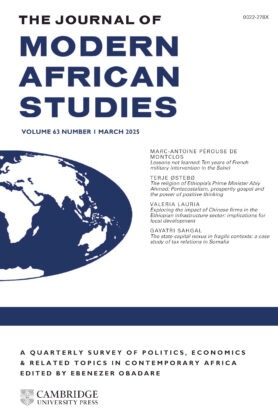This paper examines state-business relations in Somalia. It argues that the Somali case presents a unique model of private sector development, where advanced businesses in the telecommunications, banking and financial sectors emerged despite the lack of formal state structure. The establishment of a formal government in 2012, however, raised questions about the ‘nexus between state and capital’, particularly on whether state institutions were ‘pivotal’ for business. In interrogating this question, the paper employs a qualitative process tracing approach and examines the relationship between the state and one of the largest private sector players – the telecommunications sector. It focuses on tracing the tax relations, which, as the material basis of the social contract between the state and society, offered fundamental clues into the sector’s willingness to invest in the state project. The article finds that despite capital’s capacity to survive in such contexts, there are certain junctures when formal state institutions emerge as critical for business operations. Thus, rather than a straightforward structural relationship between public and private power, the Somali case explicates the moments and instances when the state becomes critical for capital accumulation and offers greater insight into the molecular processes that underlie state-capitalist relations within the African context.
Journal Article
